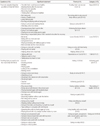Abstract
Purpose
To evaluate the effects of a logotherapy program entitled 'Finding treasures in my mind' for early adolescents with cancer.
Methods
A nonequivalent control group, non-synchronized design was conducted with a convenience sample of 22 early adolescents with cancer. The experimental group (n=12) participated in the 'Finding treasures in my mind' program which consisted of five-day sessions for one week. The control group (n=10) received the usual nursing care. The effects were measured using meaning of life (MOL) for early adolescents. The collected data were analyzed using Fisher's exact test, t-test, and content analysis.
Figures and Tables
References
1. Korean Oncology Nursing Society. Oncology nursing: Treatment and care. 2012. Seoul: Fornurse.
2. National Cancer Information Center. Statistics on cancer registration in Korea. 2007. Seoul: Author.
3. Zeltzer LK, Recklitis C, Buchbinder D, Zebrack B, Casillas J, Tsao JC, et al. Psychological status in childhood cancer survivors: A report from the childhood cancer survivor study. J Clin Oncol. 2009. 27:2396–2404.

4. Kim HS, Kang KA, Kim SJ, Kim HO, Moon SY, Yang EY, et al. Child health nursing: Care of the child and family. 2012. Seoul: Koonja.
5. Fochtman D. The concept of suffering in children and adolescents with cancer. J Pediatr Oncol Nurs. 2006. 23:92–102.

6. Shin H, Lee JH. A correlation study on the resilience of children with cancer and their mothers. J Korean Oncol Nurs. 2008. 8:24–31.
7. Frankl VE. Man's search for meaning. 1963. NY: Washington Square Press.
8. Frankl VE. The will to meaning: Foundations and applications of logotherapy. 1988. NY: Penguin.
9. Breitbart W, Heller KS. Reframing hope: Meaning-centred care for patients near the end of life. J Palliat Med. 2003. 6:979–988.
10. Kang KA, Im JI, Kim HS, Kim SJ, Song MK, Sim SY. The effect of logotherapy on the suffering, finding meaning, and spiritual well-being of adolescents with terminal cancer. J Korean Acad Child Health Nurs. 2009. 15:136–144.

11. Kang KA, Shim JS, Jeon DG, Koh MS. The effects of logotherapy on meaning in life and quality of life of late adolescents with terminal cancer. J Korean Acad Nurs. 2009. 39:759–768. http://dx.doi.org/10.4040/jkan.2009.39.6.759.

12. Cho HH, Yoon JW. Trends in research on children with cancer and their families in Korea. J Korean Acad Child Health Nurs. 2010. 16:73–83.

13. Kang KA, Kim SJ, Song MK. CD program development applied logotherapy to improve quality of life of older school-age children with terminal cancer. Korean J Hosp Palliat Care. 2008. 11:82–90.
14. Kang KA, Kim SJ, Song MK, Sim SY, Kim SH. Development of an instrument to measure meaning of life (MOL) for higher grade primary school children. J Korean Acad Child Health Nurs. 2007. 13:308–317.
15. Breitbart W. Spirituality and meaning in supportive care: Spirituality and meaning-centered group psychotherapy interventions in advanced cancer. Support Care Cancer. 2002. 10:272–280.

16. Cho HS. The effects of logotherapeutic group counseling on purpose in life, self-concept, self-esteem and spiritual wellbeing of adolescence [dissertation]. 2000. Busan: Kosin Univ.
17. Choi MO. The effects of logotherapy group counseling on the purpose in life and a life of faith of christian teenager [dissertation]. 2000. Daegu: Keimyung Univ.
18. Shim KJ. The effects of logotherapy group counseling in the level of the purpose in life of vocational high school students [dissertation]. 2001. Suncheon: Suncheon Univ..
19. Kim MA, Yi JH. Childhood cancer survivor's services needs for the better quality of life. J Korean Acad Child Health Nurs. 2012. 18:19–28.

20. Bruce M. A systematic and conceptual review of posttraumatic stress in childhood cancer survivors and their parents. Clin Psychol Rev. 2006. 26:233–256.

21. Cohen JA, Mannerino AP, Deblinger E. Treating trauma and traumatic grief in children and adolescents. 2006. NY: Guilford Press.




 PDF
PDF ePub
ePub Citation
Citation Print
Print






 XML Download
XML Download